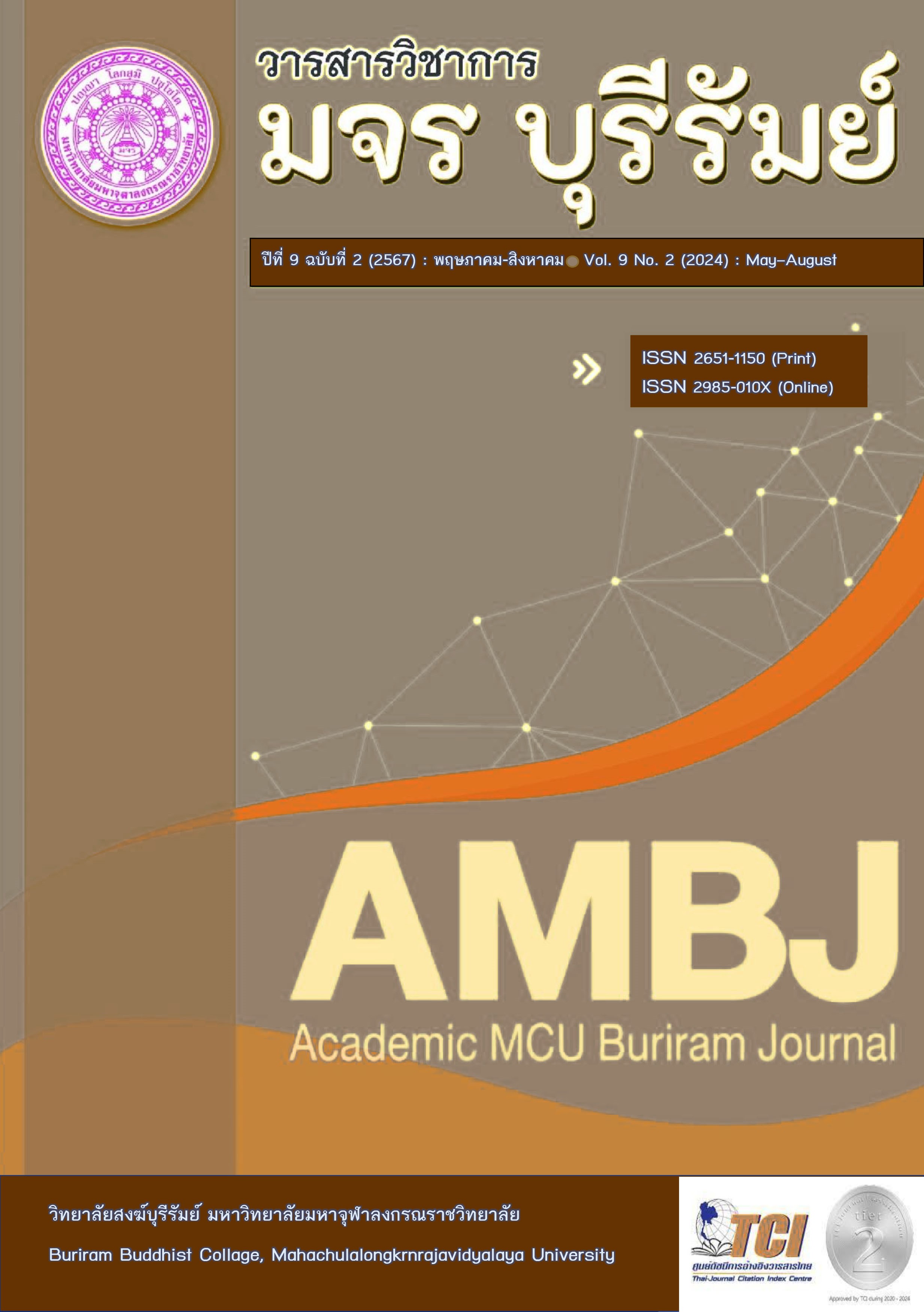The Study of Educational Inequality: A Case Study of Online Learning Due to the COVID-19 Pandemic Situation in Primary Schools in Buriram Province
Keywords:
Educational Inequality, Online Learning, The COVID-19 Pandemic Situation, Primary SchoolAbstract
The purposes of this research were: 1) to study the conditions and problems of online teaching and learning, categorized by school size: small, medium,and large 2) to study the factors contributing to educational inequality, categorized by school size : small, medium,and large and 3) to study the costs and the ratio of income to educational investment by parent, categorized by school size : small, medium, and large. The sample group consisted of students, students parents, teachers, and school administrators.
The study was conducted separately according to school sizes: small, medium, and large schools, all of which provide primary education. The total sample size was 400 participants, Determined using the random sampling method and the sample size table by Krejcie and Morgan (1970) The data collection instrument used in this study was a closed-ended questionnaire with a 5-point Likert scale.The questionnaire demonstrated a reliability coefficient of 0.87. Data analysis involved mean, standard deviation, and descriptive statistical analysis.
The research result found that:
1. Small schools faced the most problems in terms of equipment, internet access, and school support, while large schools were better prepared.
2. Factors contributing to inequality included ease of access to content, interaction with teachers, content comprehension, concerns about expenses, and parental support. Student in small schools experienced the most problems across all factors.
3. Families of students in small schools had the lowest average income (8,000 baht/month) but had to use the highest proportion of income (21.25%) for online education. In contrast, families of students in large schools had the highest average income (45,000 baht/month) and used the lowest proportion of income (10.67%).
References
ฐิติมา ปานศรี และเทอดศักดิ์ ชมโต๊ะสุวรรณ. (2562). ความเหลื่อมล้ำทางด้านชีวิตดิจิทัลในประเทศไทย. วารสารประชากรศาสตร์, 35(2), 44-62.
Andrew, Sija. (2024). Examining the online learning challenges and its relationship on learning performance: case at selected schools. European Journal of Open Education and E-Learning Studies, 9(1), 35-52. doi: 10.46827/ejoe.v9i 1.5323
Arishaba, E. (2024). Social learning theory and instructional strategies in teaching and learning in secondary schools. Journal of Research Innovation and Implications in Education, 8(1), 242-247.
Carsten, Schröder., C., Katharina, Spieß. & Johanna, Storck. (2015). Private spending on children's education: Low-income families pay relatively more. DIW Economic Bulletin, 5(8), 113-123.
Chairuddin Siregar & Irdian Ningsih. (2022). The influence of teaching materials development on student understanding in class vii islamic religious education subjects at it middle school. an-nafis teluk mengkudu district serdang bedagai district. morfai journal, 1, 488-496. 10.54443/morfai.v1i2.843.
Dilnavoz, Shavkidinova., Feruza, Suyunova. & Jasmina, Kholdarova. (2023). Education is an important factor in human and country development. Current research journal of pedagogics, 4(1), 27-34. doi: 10.37547/pedagogics-crjp-04-01-04
Eviana, Hikamudin., Hasan, Bisri. & Rahman, Wahid. (2022). Analisis Kondisi Status Sosial Ekonomi Keluarga Dalam Menunjang Pemenuhan Kebutuhan Pendidikan Anak: Status Sosial. Edusifa: Jurnal Pendidikan Islam, 7, 79-87. 10.56146/edusifa.v7i1.39
H. Ravikumar, R. Priyadharshini & P. Sinduja. (2023). “Analysis on Perception and Psychosocial Effect of Online Teaching and Regular Contact Classes Among the Parents of Children Under 10 Years”, 2023 International Conference on Business Analytics for Technology and Security (ICBATS), Dubai, United Arab Emirates, 2023, pp. 1-6, doi: 10.1109/ICBATS57792.2023.10111240.
Jan, Válek., Michaela, Hetmánková. & Ondřej, Kohout. (2022). Digital competences of teachers in vocational education in the Czech Republic. R&E-SOURCE, Special Issue (24), 102-105. doi: 10.53349/resource.2022.is24.a1115
K., Habashi., Shaun, Andersen., Deepal, Patel., Genesis, Leon., Cynthia, Lee. & Edward, Simanton. (2023). Disadvantaged Students Utilize School Campus and Its Resources More Than Non-disadvantaged Students. Cureus, 15(9), 1-9. Article e46128. doi: 10.7759/cureus.46128
Krejcie, R.V. & Morgan, D.W. (1970). Determining sample size for research activities. Educational and Psychological Measurement, 30(3), 607-610.
Luzi, Tan. (2024). Research on the Impact of COVID-19 on Education Inequality in China. Lecture Notes in Education Psychology and Public Media, 35, 62-65. doi: 10.54254/2753-7048/35/20232034
Lyudmila, Goncharenko., S., N., Naumov. & A., A., Shestakova. (2023). Problems of informatization of rural schools within the framework of the National Project “Education”. Informatika i obrazovanie, 37(6), 12-21. doi: 10.32517/0234-0453-2022-37-6-12-21
Norsabrina Sihab, Lyly Nyl Ismail & Nur Sa’adah Muhamad Sauki. (2023). The Impact of Long-Term Online Learning During the Pandemic on The Decline of Students' Cognitive Performance. International Journal of Academic Research in Progressive Education and Development, 12(2), 1579-1588. doi:10.6007/ijarped/v12-i2/16464
Risa, Fitria. (2023). Parental Involvement During Online Learning: A Study Among Low-Income Families in Indonesia. Jurnal ilmiah sekolah dasar, 7(1), 67-75. doi: 10.23887/jisd.v7i1.54006
Sait, Bayrakdar. & Ayse, Guveli. (2020). Inequalities in home learning and schools' provision of distance teaching during school closure of COVID-19 lockdown in the UK (ISER Working Paper Series No. 2020-09). University of Essex, Institute for Social and Economic Research.
Downloads
Published
How to Cite
Issue
Section
License
Copyright (c) 2024 Academic MCU Buriram Journal

This work is licensed under a Creative Commons Attribution-NonCommercial-NoDerivatives 4.0 International License.
ทัศนะและความคิดเห็นที่ปรากฏในบทความวารสารฉบับนี้ถือเป็นความรับผิดชอบของผู้เขียนบทความนั้น ไม่ถือเป็นทัศนะและความรับผิดชอบของบรรณาธิการ





